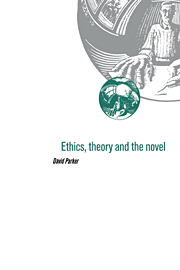Book contents
- Frontmatter
- Contents
- Acknowledgements
- Part I THE ETHICAL UNCONSCIOUS
- Chapter 1 Evaluative discourse: the return of the repressed
- Chapter 2 A new turn toward the ethical
- Chapter 3 The judgmental unconscious
- Chapter 4 The libidinal unconscious
- Chapter 5 Dynamic interrelatedness: or, the novel walking away with the nail
- Part II SOCIAL BEINGS AND INNOCENTS
- Part III TOWARDS A NEW EVALUATIVE DISCOURSE
- Notes
- Bibliography
- Index
Chapter 1 - Evaluative discourse: the return of the repressed
Published online by Cambridge University Press: 05 November 2011
- Frontmatter
- Contents
- Acknowledgements
- Part I THE ETHICAL UNCONSCIOUS
- Chapter 1 Evaluative discourse: the return of the repressed
- Chapter 2 A new turn toward the ethical
- Chapter 3 The judgmental unconscious
- Chapter 4 The libidinal unconscious
- Chapter 5 Dynamic interrelatedness: or, the novel walking away with the nail
- Part II SOCIAL BEINGS AND INNOCENTS
- Part III TOWARDS A NEW EVALUATIVE DISCOURSE
- Notes
- Bibliography
- Index
Summary
On many fronts the realisation is beginning to resurface that, as Charles Taylor has expressed it, ‘we all as human agents define ourselves against a background of distinctions of worth’. The force of that ‘all’ should not be overlooked. Some, whom Taylor calls ‘naturalists’, or who might otherwise be described as positivists or evaluative sceptics, do not acknowledge the point and may even explicitly deny it, but they cannot be exceptions ‘just because they do not recognize that they are constituted by strongly evaluative self-interpretations’. In his major recent book, Sources of the Self: The Making of the Modern Identity, Taylor does more than make the essential point that naturalist denials are everywhere contradicted by their practices. He also shows why the naturalist picture is inherently mistaken by showing that identity, our sense of who we are, is a kind of ‘orientation in moral space’. To be without any evaluative framework at all would involve a profound psychic disorientation; such a person would not simply be morally shallow or unpredictable, he or she would be frighteningly disturbed, perhaps pathological. For a person of relative normality, the naturalist picture cannot obtain, simply on the grounds that such a person must be oriented in terms of the multiple evaluative distinctions needed to answer coherently for herself in everyday life.
Taylor is not the only contemporary philosopher to argue for the inescapability of the ethical dimension, but his formulations are especially helpful in that they indicate the links between ethics and other dimensions of value.
Information
- Type
- Chapter
- Information
- Ethics, Theory and the Novel , pp. 7 - 31Publisher: Cambridge University PressPrint publication year: 1994
